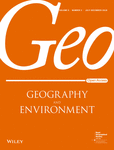
Geo-Geography and Environment
Scope & Guideline
Empowering Scholars to Shape Environmental Understanding
Introduction
Aims and Scopes
- Interdisciplinary Environmental Research:
The journal promotes research that integrates various disciplines, including social sciences, natural sciences, and humanities, to address complex environmental issues from multiple perspectives. - Focus on Sustainable Development:
There is a consistent emphasis on sustainable development, particularly how geographical and environmental factors influence and are influenced by social policies and practices. - Innovative Methodologies:
The journal encourages the use of innovative methodologies, including qualitative, quantitative, and visual methods, to enhance the understanding of geographical phenomena and environmental challenges. - Global South Perspectives:
A significant focus on the Global South highlights unique environmental and social challenges faced by these regions, aiming to amplify voices and experiences often overlooked in mainstream geographical research. - Urban and Rural Dynamics:
The journal explores both urban and rural environments, examining how geographical contexts shape environmental policies, practices, and community resilience.
Trending and Emerging
- Climate Change and Resilience:
Research around climate change adaptation and resilience strategies is on the rise, reflecting urgent global concerns and the need for innovative solutions to environmental challenges. - AI and Technology in Geography:
The integration of artificial intelligence and technology in geographical research is increasingly prominent, showcasing advancements in data analysis and modeling for environmental applications. - Social Justice and Environmental Activism:
There is a growing focus on social justice issues within environmental activism, particularly how marginalized communities engage with and are impacted by environmental policies. - Urban Ecology and Microbial Studies:
Emerging interest in urban ecology, particularly studies on microbial ecologies, highlights the complex interactions between urban environments and biological systems. - Food Systems and Sustainability:
Research on sustainable food systems, particularly within urban contexts and Global South regions, is gaining traction as food security becomes a critical global issue.
Declining or Waning
- Traditional Environmental Management:
Research focusing solely on traditional environmental management practices is becoming less common as there is a growing preference for studies that integrate social, economic, and political dimensions. - Static Geographical Models:
Static models that do not account for dynamic changes in environments and communities are seeing a decline, as researchers favor more adaptable and responsive methodologies. - Conventional Agricultural Studies:
While agricultural studies remain relevant, there is a noticeable decrease in conventional agricultural research that does not incorporate discussions on sustainability and climate resilience. - Limited Focus on Developed Nations:
There appears to be a waning interest in geographical studies centered exclusively on developed nations, with more emphasis being placed on Global South perspectives. - Narrowly Defined Ecological Studies:
Ecological studies that do not engage with broader socio-economic contexts are becoming less prevalent, as interdisciplinary approaches gain traction.
Similar Journals

AREA
Shaping Tomorrow's Urban Landscapes Through ScholarshipAREA, with ISSN 0004-0894 and E-ISSN 1475-4762, is a premier open access journal published by Wiley since 2018, and situated in the heart of the United Kingdom. Recognized as a Q1 journal in Geography, Planning, and Development for 2023, it ranks impressively at #154 out of 821 in its category on Scopus, placing it in the 81st percentile. This esteemed journal, which has been a prominent venue for scholarly discourse since its inception in 1976, invites original research articles, reviews, and commentary that advance understanding and contribute significantly to the fields of geography and urban planning. As an open access journal, AREA ensures that high-quality research is readily available to a global audience, thus facilitating knowledge exchange and encouraging innovative approaches to geographical questions. Researchers, professionals, and students alike will find AREA to be an invaluable resource for cutting-edge insights and compelling discussions that shape the future of spatial analysis and environmental policy.
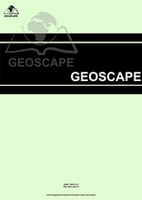
GeoScape
Advancing knowledge for a sustainable future.GeoScape is a distinguished open-access journal published by SCIENDO, operating since 2006 and aimed at fostering knowledge in the fields of Ecology, Geography, Urban Studies, and Nature and Landscape Conservation. Based in Warsaw, Poland, the journal maintains a robust academic presence with an impact factor reflective of its quality, prominently positioned in the Q3 category for multiple significant subject areas as of 2023. With its commitment to disseminating high-quality research, GeoScape holds notable Scopus rankings, including a rank of #94 in Urban Studies and #213 in Ecology, signifying its contribution to environmental science discussions. The journal serves as an essential resource for researchers, professionals, and students seeking to advance their understanding of contemporary ecological challenges and urban development in an accessible format.
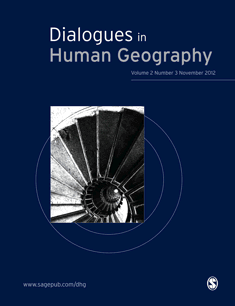
Dialogues in Human Geography
Fostering Insightful Exchanges in GeographyDialogues in Human Geography is a leading journal published by SAGE Publications Ltd, specializing in the dynamic and evolving field of human geography. With an ISSN of 2043-8206 and an E-ISSN of 2043-8214, this esteemed journal is notable for its Q1 ranking in the Geography, Planning and Development category, placing it in the top tier of social science publications. As of 2023, it boasts an impressive Scopus rank of 73 out of 821, positioning it within the 91st percentile, illustrating its significance and influence in academic discourse. Since its inception in 2011, the journal has aimed to foster critical exchanges and innovative perspectives on complex spatial and social issues. Researchers, professionals, and students alike will find engaging and thought-provoking contributions that challenge traditional notions within the field, making it an essential resource for anyone invested in understanding the intricate relationships between people and their environments.
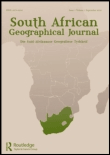
South African Geographical Journal
Shaping policy through rigorous geographical research.The South African Geographical Journal, published by Routledge Journals, Taylor & Francis Ltd, is a leading scholarly platform dedicated to advancing research in the fields of geography, planning, and development. With an impressive history spanning from 1931 to 2024, this journal not only retains its relevance in the academic community but also proudly holds a Q2 rank in both Earth and Planetary Sciences and Geography, Planning and Development, marking it as a significant contributor to the scholarly discourse. The journal is ranked in the top 32% of its category within Scopus, affirming its stature among researchers and professionals. Although it currently does not offer Open Access, the journal provides a critical forum for the exchange of ideas, methodologies, and findings, encouraging dialogue that informs policy and practice in the geographical sciences. Readers can expect a rich variety of articles that encompass both theoretical and practical aspects of geography, making it essential for academics and practitioners alike.
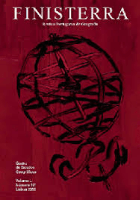
Finisterra-Revista Portuguesa de Geografia
Advancing Interdisciplinary Dialogue in GeographyFinisterra-Revista Portuguesa de Geografia is a distinguished academic journal published by the Centro de Estudos Geográficos, Universidade de Lisboa, since 1978, presenting a vital platform for research in the fields of Geography, Earth and Planetary Sciences. The journal operates under an Open Access model, encouraging broad dissemination of knowledge and ensuring that research is accessible to all, a commitment it has upheld since 2004. With a notable Q3 ranking in both Earth and Planetary Sciences (miscellaneous) and Geography, Planning and Development as of 2023, it serves as a significant conduit for scholarly discourse in these domains. The journal's scope reflects a diverse array of geographical studies, promoting interdisciplinary dialogue and research innovations, while its strategic publication history showcases its adaptability and relevance to contemporary issues. Researchers, professionals, and students alike are invited to engage with this pivotal resource that continues to shape geographical scholarship in Portugal and beyond.

Documents d Analisi Geografica
Empowering Global Discourse in Geography and PlanningDocuments d'Anàlisi Geogràfica is a distinguished academic journal published by Universitat Autònoma de Barcelona, focusing on the fields of geography, planning, and earth-surface processes since its inception in 1988. With an Open Access policy implemented in 2012, the journal aims to facilitate the widespread dissemination of geographical research and insights, accessible to a global audience. Currently ranked in Q3 for both Earth-Surface Processes and Geography, Planning and Development categories, it serves as a vital platform for researchers, practitioners, and students to share their findings and enhance knowledge in these critical fields. The journal is indexed in Scopus, where it stands at rank #470 in Social Sciences and #106 in Earth and Planetary Sciences, reflecting its growing impact in relevant academic communities. Based in Barcelona, Spain, Documents d'Anàlisi Geogràfica continues to contribute substantially to geographical scholarship by exploring contemporary issues and advancements in a rapidly evolving world.

Chinese Geographical Science
Advancing Earth Sciences through Global Perspectives.Chinese Geographical Science is a prestigious, peer-reviewed journal published by Springer, dedicated to the dynamic and interdisciplinary fields of Earth and Planetary Sciences and Geography, Planning and Development. With an impressive 2023 Q1 ranking in both categories, the journal supports the dissemination of groundbreaking research from a global perspective, reflecting its significance in the scientific community. The journal is indexed under the highly regarded Scopus database, where it ranks in the top percentile in both Geography and Earth Sciences, illustrating its commitment to excellence and impact within these disciplines. Since its inception in 1991, it has provided a vital platform for researchers and scholars to share their findings, address pressing geographical issues, and contribute to the development of innovative solutions for sustainable development. Although it operates under a subscription model, its rigorous peer-review process ensures that the highest quality of research is published. By fostering collaboration and dialogue among scholars, Chinese Geographical Science plays an essential role in advancing knowledge and shaping policy in geographical sciences and beyond.

Cadernos de Geografia
Fostering Academic Excellence in Geographical ResearchCadernos de Geografia is a distinguished biannual journal published by UNIVERSIDADE DE COIMBRA, FACULDADE DE LETRAS, dedicated to the field of geography and related social sciences. With its ISSN 0871-1623 and E-ISSN 2183-4016, this journal has been a prominent platform for the dissemination of high-quality research since it became open access in 2012. Situated in Coimbra, Portugal, it aims to foster academic excellence by providing an inclusive space for innovative studies that explore contemporary geographical issues. Cadernos de Geografia encourages submissions that address diverse aspects of geography, ranging from environmental studies to urban planning, making it an invaluable resource for researchers, professionals, and students alike. As a part of the growing trend in open-access publishing, it enhances the global reach and accessibility of geographical research, thereby contributing to the enrichment of knowledge in the field.
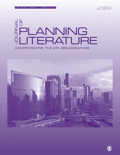
JOURNAL OF PLANNING LITERATURE
Unveiling Trends in Urban and Regional PlanningJOURNAL OF PLANNING LITERATURE, published by SAGE PUBLICATIONS INC, stands as a premier journal in the field of planning, geography, and development since its inception in 1985. With an impressive impact factor and a top-tier ranking in the Q1 category as per Scopus, it is a vital resource for researchers, professionals, and students committed to advancing the discipline. The journal's scope encompasses a wide array of topics related to planning literature, offering critical insights and fostering academic discourse that serves both theoretical and practical interests. Notably, it ranks #37 out of 821 in its category, positioning it in the 95th percentile for excellence. Although it does not currently offer Open Access options, the journal's rigorous peer-reviewed content and authoritative articles make it indispensable for anyone interested in the latest developments and trends in planning studies. With its commitment to high-quality research, JOURNAL OF PLANNING LITERATURE is dedicated to shaping the future of urban and regional planning research.
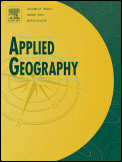
APPLIED GEOGRAPHY
Navigating the complexities of tourism and environmental science.APPLIED GEOGRAPHY, published by Elsevier Science Ltd, stands as a premier journal within the fields of environmental science, geography, planning and development, as well as tourism, leisure, and hospitality management. With an impressive 2023 impact factor that reflects its high citation rates, this journal is ranked Q1 in several categories, underscoring its significance and influence in interdisciplinary research. Covering a broad range of topics from innovative environmental practices to spatial analysis and socio-economic factors affecting tourism, APPLIED GEOGRAPHY promotes insightful discussions and practical applications that are vital for advancing knowledge and practice in these fields. Researchers, professionals, and students will find the journal's rigorous peer-reviewed articles invaluable for staying informed about the latest trends and findings impacting the geospatial landscape. As an essential resource, APPLIED GEOGRAPHY aims to foster interdisciplinary collaborations and inspire scholarly dialogue, making it a cornerstone for those engaged in the study and application of geography across various sectors.